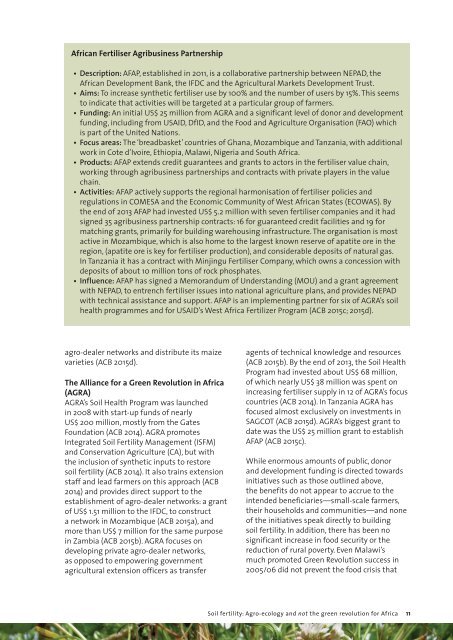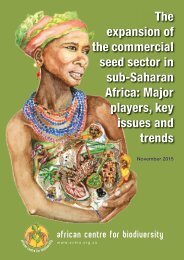SOIL FERTILITY
2aNyn6A
2aNyn6A
You also want an ePaper? Increase the reach of your titles
YUMPU automatically turns print PDFs into web optimized ePapers that Google loves.
African Fertiliser Agribusiness Partnership<br />
• Description: AFAP, established in 2011, is a collaborative partnership between NEPAD, the<br />
African Development Bank, the IFDC and the Agricultural Markets Development Trust.<br />
• Aims: To increase synthetic fertiliser use by 100% and the number of users by 15%. This seems<br />
to indicate that activities will be targeted at a particular group of farmers.<br />
• Funding: An initial US$ 25 million from AGRA and a significant level of donor and development<br />
funding, including from USAID, DfID, and the Food and Agriculture Organisation (FAO) which<br />
is part of the United Nations.<br />
• Focus areas: The ‘breadbasket’ countries of Ghana, Mozambique and Tanzania, with additional<br />
work in Cote d’Ivoire, Ethiopia, Malawi, Nigeria and South Africa.<br />
• Products: AFAP extends credit guarantees and grants to actors in the fertiliser value chain,<br />
working through agribusiness partnerships and contracts with private players in the value<br />
chain.<br />
• Activities: AFAP actively supports the regional harmonisation of fertiliser policies and<br />
regulations in COMESA and the Economic Community of West African States (ECOWAS). By<br />
the end of 2013 AFAP had invested US$ 5.2 million with seven fertiliser companies and it had<br />
signed 35 agribusiness partnership contracts: 16 for guaranteed credit facilities and 19 for<br />
matching grants, primarily for building warehousing infrastructure. The organisation is most<br />
active in Mozambique, which is also home to the largest known reserve of apatite ore in the<br />
region, (apatite ore is key for fertiliser production), and considerable deposits of natural gas.<br />
In Tanzania it has a contract with Minjingu Fertiliser Company, which owns a concession with<br />
deposits of about 10 million tons of rock phosphates.<br />
• Influence: AFAP has signed a Memorandum of Understanding (MOU) and a grant agreement<br />
with NEPAD, to entrench fertiliser issues into national agriculture plans, and provides NEPAD<br />
with technical assistance and support. AFAP is an implementing partner for six of AGRA’s soil<br />
health programmes and for USAID’s West Africa Fertilizer Program (ACB 2015c; 2015d).<br />
agro-dealer networks and distribute its maize<br />
varieties (ACB 2015d).<br />
The Alliance for a Green Revolution in Africa<br />
(AGRA)<br />
AGRA’s Soil Health Program was launched<br />
in 2008 with start-up funds of nearly<br />
US$ 200 million, mostly from the Gates<br />
Foundation (ACB 2014). AGRA promotes<br />
Integrated Soil Fertility Management (ISFM)<br />
and Conservation Agriculture (CA), but with<br />
the inclusion of synthetic inputs to restore<br />
soil fertility (ACB 2014). It also trains extension<br />
staff and lead farmers on this approach (ACB<br />
2014) and provides direct support to the<br />
establishment of agro-dealer networks: a grant<br />
of US$ 1.51 million to the IFDC, to construct<br />
a network in Mozambique (ACB 2015a), and<br />
more than US$ 7 million for the same purpose<br />
in Zambia (ACB 2015b). AGRA focuses on<br />
developing private agro-dealer networks,<br />
as opposed to empowering government<br />
agricultural extension officers as transfer<br />
agents of technical knowledge and resources<br />
(ACB 2015b). By the end of 2013, the Soil Health<br />
Program had invested about US$ 68 million,<br />
of which nearly US$ 38 million was spent on<br />
increasing fertiliser supply in 12 of AGRA’s focus<br />
countries (ACB 2014). In Tanzania AGRA has<br />
focused almost exclusively on investments in<br />
SAGCOT (ACB 2015d). AGRA’s biggest grant to<br />
date was the US$ 25 million grant to establish<br />
AFAP (ACB 2015c).<br />
While enormous amounts of public, donor<br />
and development funding is directed towards<br />
initiatives such as those outlined above,<br />
the benefits do not appear to accrue to the<br />
intended beneficiaries—small-scale farmers,<br />
their households and communities—and none<br />
of the initiatives speak directly to building<br />
soil fertility. In addition, there has been no<br />
significant increase in food security or the<br />
reduction of rural poverty. Even Malawi’s<br />
much promoted Green Revolution success in<br />
2005/06 did not prevent the food crisis that<br />
Soil fertility: Agro-ecology and not the green revolution for Africa 11



